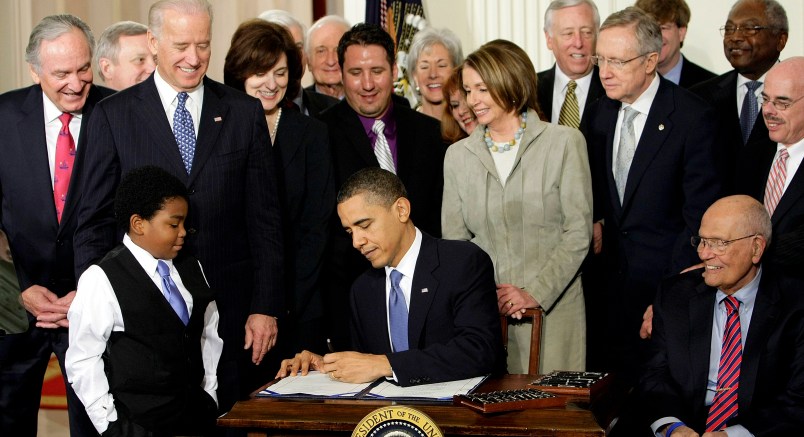Weeks into Obamacare’s disastrous rollout last fall, Democrats’ worst nightmares were coming true. The politics were so dreadful that even liberal stalwarts like Oregon Sen. Jeff Merkley were endorsing “fixes” to gut key elements of the law. One Democratic Senate aide expressed concern that that the law’s failures could cause a Republican sweep in every open seat and every contested red state in the 2014 elections.
Nine months later, Obamacare has rebounded, and the politics have changed dramatically. Democrats’ Senate majority remains in jeopardy, but Obamacare is no longer the silver bullet that Republicans once thought it was. It is gradually losing its power as a political weapon.
The number of ads attacking Obamacare in battleground states like North Carolina, Louisiana and Arkansas plummeted between April and July, according to data collected by media trackers. Republican pollsters have found that the most effective attacks on the law are the most dubious. Now even Sen. Mark Pryor (D-AR), one of the most vulnerable incumbents this cycle, is touting his support for the law in a new television ad.
So, what changed?
In short, Obamacare is working largely as intended. More than 10 million Americans have gained coverage and the national uninsured rate is falling, with better results in states that embraced it. Some states which rejected the law’s Medicaid expansion saw modest upticks in uninsured. The sprawling law has certainly created its share of losers, but many of the horror stories touted by opponents have turned out to be exaggerated or false.
In Kentucky, Senate Minority Leader Mitch McConnell (R) has been tripped up by the fact that Obamacare has cut his state’s uninsured rate by more than 40 percent. In Connecticut, early warnings of a 12.5 percent premium hike by one insurer turned out to be wrong; the insurer actually revealed it will lower its average premiums in 2015, albeit very slightly.
As a result, Republicans have tamed their attacks on Obamacare, and national Democratic strategists are less worried about it hurting their candidates.
“[I]t’s clear that the GOP strategy of winning back the Senate on ACA alone
has failed. Voters agree with Democrats like Mark Pryor who believe we
should be holding big insurance companies accountable,” said Justin Barasky, a spokesman for the Democratic Senatorial Campaign Committee.
Republicans noted that Pryor’s ad didn’t use the words “Obamacare” or “Affordable Care Act.”
“Most viewers of Mark Pryor’s ad wouldn’t even realize that the embattled Senator is talking about Obamacare – aka the ‘Affordable Care Act.’ If Pryor had openly embraced Obamacare and reiterated his support for the law, it’d be one thing but this ad is clearly an attempt to inoculate a very vulnerable senator from a law that is extremely unpopular in his state,” said Brad Dayspring, a spokesman for the National Republican Senatorial Committee. “Ensuring that people with preexisting conditions have access to coverage has long been a popular policy, and one where there is bipartisan agreement.”
Dayspring maintains that Obamacare, which remains unpopular nationally, will damage Democrats in November. “Like many other senators, Mark Pryor’s support for Obamacare is a major impediment to his campaign, but not the lone one,” he said.
The 2014 Senate map is so favorable to the GOP — 15 Republicans are up for reelection, nearly all in safe states, while 21 Democrats are up for reelection, many in red states — that Obamacare is highly unlikely to help Democrats even in the best case scenario. The law remains very unpopular with conservative voters, many of whom haven’t yet had the chance to punish their senator at the ballot box for voting for it.
But the issue is increasingly fading on the 2014 campaign trail as Obamacare weaves itself deeper into the fabric of American society.







Imagine, the US is becoming more like a normal industrialized country. Those who don’t want this are largely free-riders that benefited under the ancien régime.
Much as Social Security and Medicare disappeared as weapons, because the people liked them.
Which Bill Kristol predicted back in the age of Hillarycare. Remember, a broken clock is right twice a day… and Kristol is very broken!)
“…In short, Obamacare is working…”
Congress isn’t.
I wonder if anybody in the Republican base will realize they’ve been lied to and manipulated these past few years as to what the Affordable Care Act is, how it functions, and who benefits. Like how Benghazi fizzled into an obvious right-wing set of lies that’s also completely disappeared from Fox News discourse.
Unlikely.